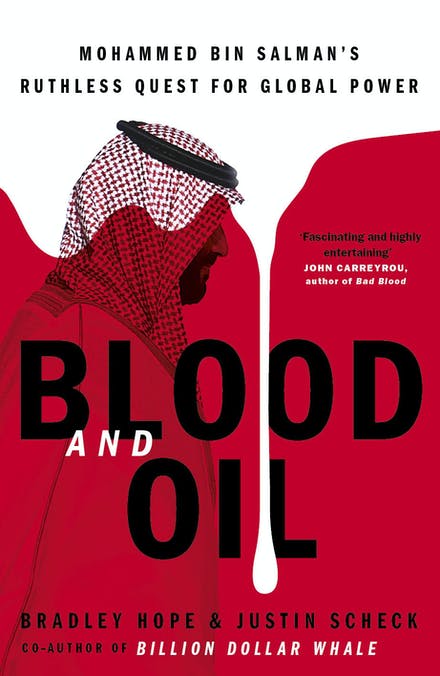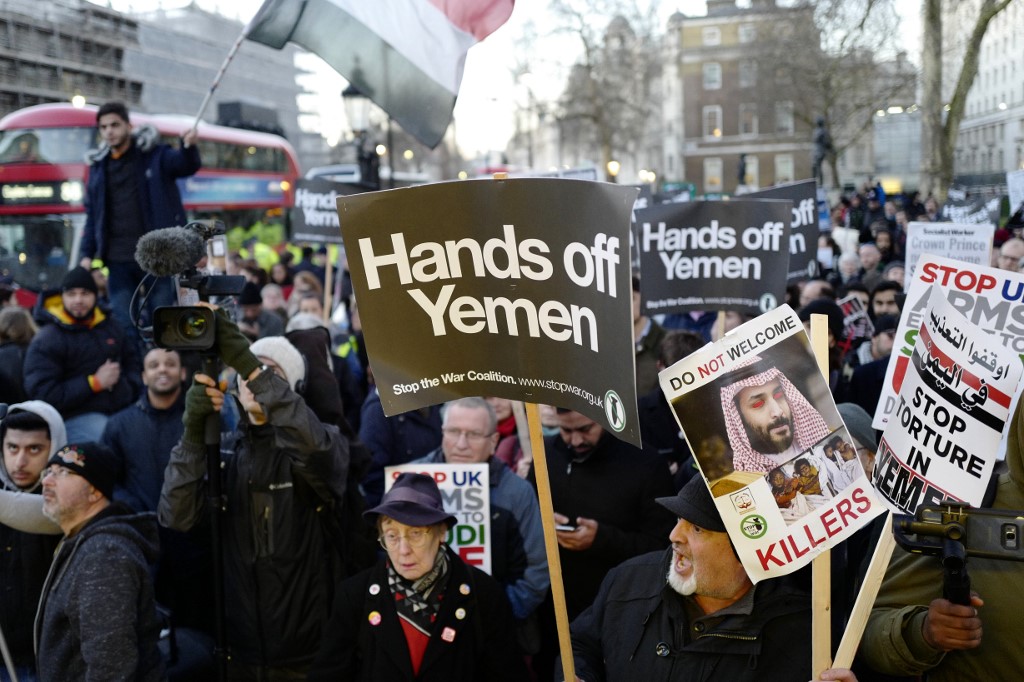Blood and Oil: Saudi palace gossip, orientalism and MBS's invisible war

It was the enduring image from Donald Trump’s 2017 visit to Saudi Arabia, in his first trip abroad as president of the United States. In it, Trump appeared alongside Saudi Arabia’s King Salman and Egyptian President Abdel Fattah el-Sisi with their hands placed on a glowing orb of unexplained meaning or purpose. The photo immediately went viral, eliciting a mixture of bafflement and derision worldwide.
We now know, from a new book on the rise of Saudi Crown Prince Mohammed bin Salman (widely known as MBS), that the supposed counter-extremism centre in which the presidents and the king were standing was, in fact, a hotel lobby that had been hastily made over for the photo op.
This compounds the already evident absurdity of three leaders themselves implicated in extensive state violence and repression, solemnly pledging their deep commitment to anti-extremism. As a cheap, shallow gimmick that tried and failed to rebrand an unmistakably brutal form of power, the episode could scarcely have been more emblematic of the rule of the Saudi crown prince to date.
Amassing power
The rise of MBS is now a familiar story. Upon taking the throne in January 2015, King Salman appointed his young son, Mohammed, to the role of defence minister, after which the latter swiftly manoeuvred his way to the top of the government, amassing power and dispatching rivals with singular ruthlessness along the way.
Now the kingdom’s de facto ruler, with his father as a remote figurehead, MBS has pursued an aggressive policy agenda, presented in terms of social and economic “modernisation” and “reform”. He has gained a reputation for mafia-like thuggishness, above all for his henchmen’s murder of dissident journalist Jamal Khashoggi in October 2018.
In their new book, Blood and Oil, Bradley Hope and Justin Scheck of the Wall Street Journal give us a highly readable inside account of the rise of MBS, based on extensive interviews with key sources. A well-known narrative is enriched and fleshed out with diverting anecdotes and eye-catching details.
We gain closer knowledge of how the prince plotted his rise, of how he neutralised rival power centres within the House of Saud, and of the eye-watering ostentation of a man keen to present himself as putting an end to corrupt practices among the Saudi elite.
Blood and Oil never truly escapes, and often reproduces, the standard Orientalist framing of the MBS story - namely, that the crown prince is trying to drag a backwards Arab country up to enlightened western standards.
MBS has himself mobilised these tropes to his own advantage. He tailors the appeal of his public relations narrative directly to the chauvinism and racism of the western political class, presenting himself as a uniquely forward-thinking interlocutor between their exalted selves and a culturally hidebound society that only he can fix.
Sustaining authoritarian rule
As Palestinian scholar Edward Said originally showed us, the juxtaposed binary of a modern West versus a backward East has long played a legitimising role in the projection of western power into the Arab majority world.
In the modern context, it obscures the decisive part played by the likes of the US and UK in sustaining authoritarian rule and helping the region’s monarchs to crush the grassroots agents of genuine reform. The discourse externalises authoritarianism onto the Middle East as a cultural trait, maintaining a sense of western innocence even as the arms flow and the training of internal security services continues.
The book's indifference to the people of Yemen reflects the indifference of the class of people from which Hope and Scheck drew their sources
Authoritarian rule has survived on the Arabian Peninsula in the face of repeated challenges from below, primarily due to decades of collusion between the ruling classes of the region and the West. Hope and Scheck present a picture of a crown prince moving comfortably within this modern elite of politicians, fund managers, CEOs and military top brass.
A cast of characters - from former UK prime minister Tony Blair, to former CIA director David Petraeus, to SoftBank’s Masayoshi Son - gravitate towards his sales pitch, whether through personal greed, doe-eyed credulity, or some mixture of the two. Only very late in the day, especially after the Khashoggi murder, does a sense of nervous disquiet creep in, at least for some.
Policy failures
The authors often note what might be described as the crown prince’s professional capabilities: his hard work, head for numbers, and single-minded pursuit of a strategic vision. But this image sits uneasily with the long list of policy failures that comes through in the narrative.
The intervention in Yemen was supposed to be brief and decisive, but has descended into a half-decade-long quagmire. The blockade on Qatar also wound up demonstrating impotence rather than strength, as did the failed attempt to magic away the influence of Hezbollah in Lebanon by kidnapping the country’s prime minister.
Worst of all was the collapse of the central plank of the crown prince’s entire economic strategy. Saudi economic diversification was supposed to be funded by foreign direct investment, siphoned through the international flotation of part of the state oil giant, Aramco. In the end, the flotation was domestic, attracted Saudi and regional capital primarily, and (no matter how predictably lucrative given Aramco’s size) raised nothing like the numbers envisaged.
This, according to Hope and Scheck, was the outcome widely predicted by Saudi oil officials from the beginning.
The litany of failures was capped off in the spring of 2020 by Saudi Arabia’s decision to launch an oil price war with Russia, coinciding with a historic global demand crash triggered by the coronavirus pandemic. Having failed to wean the kingdom off its dependence on oil, MBS had now slashed national oil income in yet another hot-headed and ill-judged move. And, having failed in his attempts to attract the foreign capital needed to secure the long-term acquiescence of the Saudi population, there would instead be another round of austerity.
Pathologies of royal privilege
As the authors allude, the goal of MBS was never to “modernise” the country for the benefit of his subjects. Rather, his aim was to amass state power, preclude a Saudi “spring” by buying off the country’s youth through social reforms, offset this with a vicious crackdown on even mild dissent, and diversify the economy to secure al-Saud rule into the post-oil era. As a strategy for entrenching monarchical rule, it is broadly a sound one, within its own corrupt, authoritarian parameters.
But the picture reinforced through Blood and Oil is of a crown prince accustomed to getting his own way simply by throwing his weight around and lacking the wit and dexterity to apply any other approach. Even now, MBS seems incapable of grasping that in international terms, he is nothing more than the ruler of a middle income country dependent for his regime’s security on foreign goodwill.
It remains to be seen whether either his own rule or the regime itself can survive this style of governance in the long term. If not, it will be the very pathologies of royal privilege that played a major role in hastening the end.
Hope and Scheck have carried out a worthwhile exercise in investigative journalism that brings all these elements into focus. But there is one jarring omission: the intervention in Yemen’s civil war is barely discussed, despite being by far the most significant act of bin Salman’s rule to date.
Untold stories
Saudi coalition bombing is responsible for most of the war’s tens of thousands casualties, through widespread and systematic attacks on civilian targets, documented by the UN and the world’s most respected NGOs.
The blockade imposed on the country by the Saudis and their Emirati allies is the leading cause of what is now the world’s worst humanitarian disaster, in which 85,000 children under the age of five are estimated to have died of starvation or preventable disease. Millions teeter on the brink of famine.
For this, history will likely indict MBS as a war criminal, with the western states who provided arms as his indispensible accessories. Yet, in a book of more than 300 pages, just four focus substantively on Yemen, which is otherwise relegated to a few passing mentions.
Those pages give little sense of the human costs of the Saudi intervention, portraying it as a mishandled act of national self-defence against Iran - a version of events that is somewhat generous to Riyadh, to put it very gently indeed.
The book’s indifference to the people of Yemen reflects the indifference of the class of people from which Hope and Scheck drew their sources. It is a striking example of a broader systemic failure of western media to fully alert their audiences to the complicity of their governments, a failure that has allowed the Saudi bombing and blockade to continue undisturbed.
Salacious palace gossip aside, it was these stories, more than any other, that really needed to be told.
The views expressed in this article belong to the author and do not necessarily reflect the editorial policy of Middle East Eye.




0 Comments:
Post a Comment
Subscribe to Post Comments [Atom]
<< Home